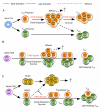The significance of OX40 and OX40L to T-cell biology and immune disease
- PMID: 19426222
- PMCID: PMC2729757
- DOI: 10.1111/j.1600-065X.2009.00766.x
The significance of OX40 and OX40L to T-cell biology and immune disease
Abstract
OX40 (CD134) and its binding partner, OX40L (CD252), are members of the tumor necrosis factor receptor/tumor necrosis factor superfamily and are expressed on activated CD4(+) and CD8(+) T cells as well as on a number of other lymphoid and non-lymphoid cells. Costimulatory signals from OX40 to a conventional T cell promote division and survival, augmenting the clonal expansion of effector and memory populations as they are being generated to antigen. OX40 additionally suppresses the differentiation and activity of T-regulatory cells, further amplifying this process. OX40 and OX40L also regulate cytokine production from T cells, antigen-presenting cells, natural killer cells, and natural killer T cells, and modulate cytokine receptor signaling. In line with these important modulatory functions, OX40-OX40L interactions have been found to play a central role in the development of multiple inflammatory and autoimmune diseases, making them attractive candidates for intervention in the clinic. Conversely, stimulating OX40 has shown it to be a candidate for therapeutic immunization strategies for cancer and infectious disease. This review provides a broad overview of the biology of OX40 including the intracellular signals from OX40 that impact many aspects of immune function and have promoted OX40 as one of the most prominent costimulatory molecules known to control T cells.
Figures



References
-
- Paterson DJ, et al. Antigens of activated rat T lymphocytes including a molecule of 50,000 Mr detected only on CD4 positive T blasts. Mol Immunol. 1987;24:1281–90. - PubMed
-
- Calderhead DM, Buhlmann JE, van den Eertwegh AJ, Claassen E, Noelle RJ, Fell HP. Cloning of mouse Ox40: a T cell activation marker that may mediate T-B cell interactions. J Immunol. 1993;151:5261–71. - PubMed
-
- Gramaglia I, Weinberg AD, Lemon M, Croft M. OX40 ligand: a potent costimulatory molecule for sustaining primary CD4 T cell responses. J Immunol. 1998;161:6510–7. - PubMed
Publication types
MeSH terms
Substances
Grants and funding
LinkOut - more resources
Full Text Sources
Other Literature Sources
Research Materials

